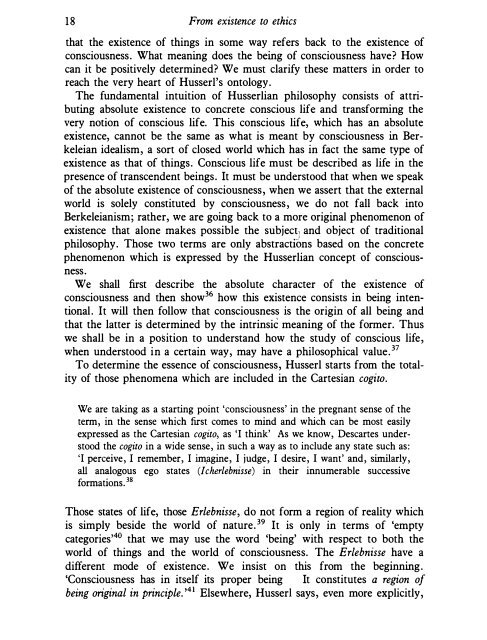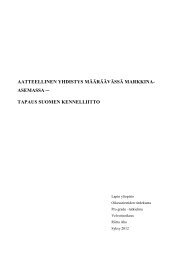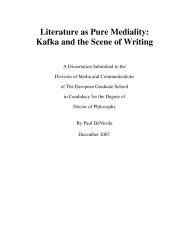- Page 1 and 2: TheLevinas ReaderEmmanuel LevinasED
- Page 3 and 4: ContentsPrefaceAcknowledgementsvvuI
- Page 5 and 6: PrefaceEmmanuel Levinas is one of t
- Page 7: AcknowledgementsThe editor and publ
- Page 10 and 11: Introduction 3world. Dasein is thus
- Page 12 and 13: Introduction 5me an individual 'I'.
- Page 14 and 15: Introduction 7sacred histor rather
- Page 16 and 17: PART IFrom Existence to Ethics
- Page 18 and 19: 12 From existence to ethics['Etrang
- Page 21 and 22: The phenomenological theory of bein
- Page 23: The phenomenological theory of bein
- Page 27 and 28: The phenomenological theory of bein
- Page 29 and 30: The phenomenological theory of bein
- Page 31: The phenomenological theory of bein
- Page 38 and 39: 32 From existence to ethicsname the
- Page 40 and 41: 34 From existence to ethicsmurther
- Page 42 and 43: 36 Prom existence to ethicsNOTE1 Ma
- Page 44 and 45: 38 Prom existence to ethicsThe use
- Page 46 and 47: 40 From existence to ethicsmerges w
- Page 48 and 49: 42 From existence to ethicsDunsinan
- Page 50: 44 From existence to ethicsBergson1
- Page 53 and 54: Time and the other 47initiative. Th
- Page 55 and 56: Time and the other 49Neither is the
- Page 57 and 58: Time and the otherSIupon here - vol
- Page 59 and 60: Time and the other 53logical value,
- Page 61 and 62: Time and the other 557 ['If] I brea
- Page 63 and 64: Time and the other 57here an allusi
- Page 65 and 66: 4Martin Buber and the Theory ofKnow
- Page 67 and 68: Martin Buber and the theory of know
- Page 69 and 70: Martin Buber and the theory of know
- Page 71 and 72: Martin Buber and the theory of know
- Page 73 and 74: Martin Buber and the theory of know
- Page 75 and 76:
Martin Buber and the theory of know
- Page 77 and 78:
Martin Buber and the theory of know
- Page 79 and 80:
Martin Buber and the theory of know
- Page 81 and 82:
5Ethics as First PhilosophyPublishe
- Page 83 and 84:
Ethics as first philosophy 77his Th
- Page 85 and 86:
Ethics as first philosophy 79Husser
- Page 87 and 88:
Ethics as first philosophy 81probab
- Page 89 and 90:
Ethics as first philosophy 83cover
- Page 91 and 92:
Ethics as first philosophy 85the ot
- Page 93 and 94:
Ethics as first philosophy 87Spirit
- Page 95 and 96:
Substitution89Ich bin du, wennich i
- Page 97 and 98:
Substitution 91everything that is i
- Page 99 and 100:
Substitution 93as in exile. It will
- Page 101 and 102:
Substitution9Splays, in order that
- Page 103 and 104:
Substitution 97oneself contributes
- Page 105 and 106:
Substitution 99against the walls of
- Page 107 and 108:
Substitution 101ted one who does no
- Page 109 and 110:
Substitution 103But how does the pa
- Page 111 and 112:
Substitution 105exactly, of which i
- Page 113 and 114:
Substitution 107this entity. Substi
- Page 115 and 116:
Substitution 109the other, turns in
- Page 117 and 118:
Substitution 111than any inertia, i
- Page 119 and 120:
Substitution 113confirms its electi
- Page 121 and 122:
Substitution 115to open an unlimite
- Page 123 and 124:
Substitution 117of the subject is a
- Page 125 and 126:
Substitution 119neglect all the det
- Page 127 and 128:
Substitution 121There is question o
- Page 129 and 130:
Substitution 123reverting into suff
- Page 131 and 132:
Substitution 125for it. Value in it
- Page 133 and 134:
7Reality and Its ShadowPublished in
- Page 135 and 136:
Reality and its shadow 131does in a
- Page 137 and 138:
Reality and its shadow 133subject i
- Page 139 and 140:
Reality and its shadow 135these dev
- Page 141 and 142:
Reality and its shadow 137The notio
- Page 143 and 144:
Reality and its shadow 139liberty,
- Page 145 and 146:
Reality and its shadow 141longed li
- Page 147 and 148:
Reality and its shadow 143half the
- Page 149 and 150:
The transcendence of words 145of Bi
- Page 151 and 152:
The transcendence of words 147objec
- Page 153 and 154:
The transcendence of words 149lette
- Page 155 and 156:
The servant and her master 151the r
- Page 157 and 158:
The servant and her 17Ulster 153Mid
- Page 159 and 160:
The servant and her master 155futur
- Page 161 and 162:
The servant and her master 157know
- Page 163 and 164:
The servant and her master 159call
- Page 165 and 166:
The other in Proust 161The timeless
- Page 167 and 168:
The other in Proust 163while remain
- Page 169 and 170:
The other in Proust 165Marcel's lov
- Page 171 and 172:
God and philosophy 167For a full ac
- Page 173 and 174:
God and philosophy 169In fact, in s
- Page 175 and 176:
God and philosophy 171apperception
- Page 177 and 178:
God and philosophy 173The bearers o
- Page 179 and 180:
God and philosophy 175Infinite ther
- Page 181 and 182:
God and philosophy 179just this emi
- Page 183 and 184:
God and philosophy 181responsibilit
- Page 185 and 186:
God and philosophy 183wardness. Sin
- Page 187 and 188:
God and philosophy 185In sketching
- Page 189 and 190:
God and philosophy 187NOTES1 Cf. Ot
- Page 191 and 192:
God and philosophy 18921 The-one-fo
- Page 193 and 194:
Revelation in the Jewish traditionT
- Page 195 and 196:
Revelation in the Jewish tradition
- Page 197 and 198:
Revelation in the Jewish tradition
- Page 199 and 200:
Revelation in the Jewish tradition
- Page 201 and 202:
Revelation in the Jewish tradition
- Page 203 and 204:
Revelation in the Jewish tradition
- Page 205 and 206:
Revelation in the Jewish tradition
- Page 207 and 208:
Revelation in the Jewish tradition
- Page 209 and 210:
Revelation in the Jewish tradition
- Page 211 and 212:
Revelation in he Jewish tradition 2
- Page 213 and 214:
13The PactPublished in L'Au-Dela du
- Page 215 and 216:
The pact 213fellows, surely this st
- Page 217 and 218:
The pact 215neighbour's property),
- Page 219 and 220:
The pact 217thereon all the words o
- Page 221 and 222:
The pact 219I am sure that some peo
- Page 223 and 224:
The pact 221our text distinguishes
- Page 225 and 226:
The pact 223discussion of the Law o
- Page 227 and 228:
The pact 225of responsibility. The
- Page 229 and 230:
14Prayer Without DemandPublished in
- Page 231 and 232:
Prayer without demand 229problemati
- Page 233 and 234:
Prayer without demand 231him to dis
- Page 235 and 236:
Prayer without demand 233der and ad
- Page 237 and 238:
15Ideology and Idealism'Ideology an
- Page 239 and 240:
Ideology and idealism 237shameful.
- Page 241 and 242:
Ideology and idealism 239the subjec
- Page 243 and 244:
Ideology and idealism 241Has scienc
- Page 245 and 246:
Ideology and idealism 243approached
- Page 247 and 248:
Ideology and idealism 245others wit
- Page 249 and 250:
Ideology and idealism 247is mention
- Page 251 and 252:
16Difficult FreedomThe title 'Diffi
- Page 253 and 254:
l)icull jTeedor.n 251trine and cont
- Page 255 and 256:
Difficult freedom 253difficult to d
- Page 257 and 258:
Difficult freedom 255which this tra
- Page 259 and 260:
Difficult freedom 257that has seen
- Page 261 and 262:
Difficult freedom 259morality. The
- Page 263 and 264:
Difficult freedom 261established by
- Page 265 and 266:
Difficult freedom 263principles and
- Page 267 and 268:
Difficult freedOm 265accept one's o
- Page 269 and 270:
17ZionismsThe following three essay
- Page 271 and 272:
Zionisms 269consent to it, and does
- Page 273 and 274:
Zionisms 271for you.' The (scroll)
- Page 275 and 276:
Zionisms 273exercise dominion over
- Page 277 and 278:
Zionisms 275terms of political acti
- Page 279 and 280:
Zionisms 277patient endurance, Isra
- Page 281 and 282:
Zionisms 279on the moon, though no
- Page 283 and 284:
Zionisms 281exposed to persecution
- Page 285 and 286:
Zionisms 283longer irreparable. So
- Page 287 and 288:
Zionisms 285The value-judgment that
- Page 289 and 290:
Zionisms 287Of the 613 commandments
- Page 291 and 292:
18Ethics and PoliticsOn 14 Septembe
- Page 293 and 294:
Ethics and politics 291inflicted on
- Page 295 and 296:
Ethics and politics 293However, the
- Page 297 and 298:
Ethics and politics 295politics, bu
- Page 299 and 300:
Ethics and politics 297argument - t
- Page 301 and 302:
Glossary 299HaskalahHiddushimHittel
- Page 303 and 304:
BibliographyThe standard bibliograp
- Page 305 and 306:
Bibliography 303CX, 15-17.'Levy-Bru
- Page 307 and 308:
Bibliography 305'Le
- Page 309 and 310:
Bibliography 307Chalier, Catherine,
- Page 311 and 312:
Index 309fecundity, 38, 52-4feminin
- Page 313:
IndexWahlf J., 37, 137wakefulness,





